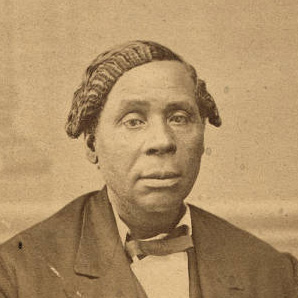
Photo info ...
Pictured: Rev. Willis R. Revels, ca. 1880Credit: Indiana Historical SocietyView Source
(1810-Mar. 6, 1879). Born in Fayetteville, North Carolina, to free parents, Willis R. Revels first came to Indiana when he attended Union Literary Institute, a Quaker academy. His brother, Hiram Rhodes Revels, also attended this school and later became a United States senator from Mississippi (1870-1871).
Early in his career, Revels was an itinerant preacher for the African Methodist Episcopal (AME) Church, ministering to churches in New Orleans, St. Louis, Louisville, Chicago, and Terre Haute. He married Susan Jones in 1836. In 1845, the Indiana Colonization Society contracted him to be its agent and travel to Liberia to report on conditions there, with the intention of gaining Black Americans’ confidence in the plan. After protest from the national AME Church, he refused to go or to support the colonization effort.
Revels was pastor of as early as 1845 and ministered there through the Civil War. During this time, he was heavily involved with the Freedman’s Aid Society, which assisted fugitives and free Black migrants. One of the few local Black residents to be active in this work, he hosted Black refugees passing through Indianapolis in his home and helped others to find work locally. It is believed that opponents of his work set fire to his church on July 9, 1862.
In 1862, Revels wrote to Governor on behalf of the local African American community asking for permission to serve in the Home Guard for Indianapolis. The governor rejected the offer, concluding that the guard was large enough and that he had no authority to accept Black troops. Instead, Revels served as a recruiting officer for Black soldiers who then fought with Massachusetts troops. He also had the responsibility of caring for these soldiers’ families.
Revels was elected to the national AME Church conference and was one of five Black people appointed to attend the white national Methodist conference in 1864. At that time, he reflected the change in AME opinion in favor of colonization efforts in Liberia.
In 1865, Revels hosted several national Black leaders to mark the anniversary of the Emancipation Proclamation. That same year, he joined with a group of Quakers to present a petition requesting the expansion of rights for Indiana’s Black residents to the Indiana General Assembly.

Help improve this entry
Contribute information, offer corrections, suggest images.
You can also recommend new entries related to this topic.